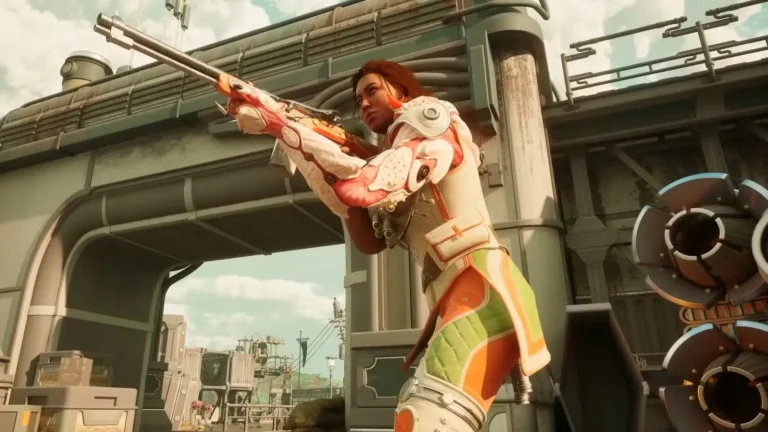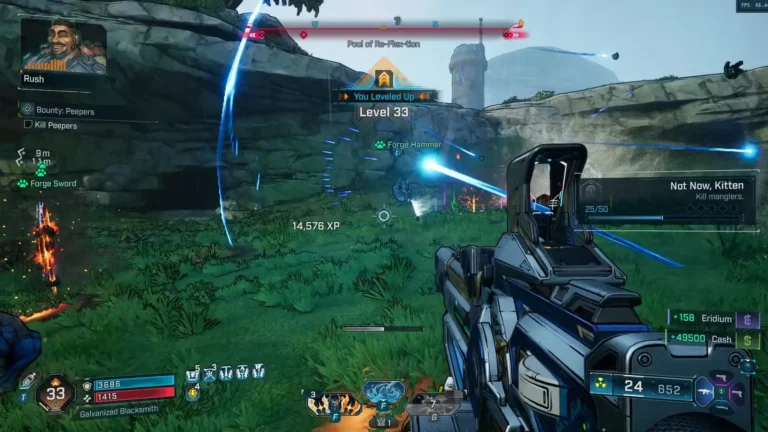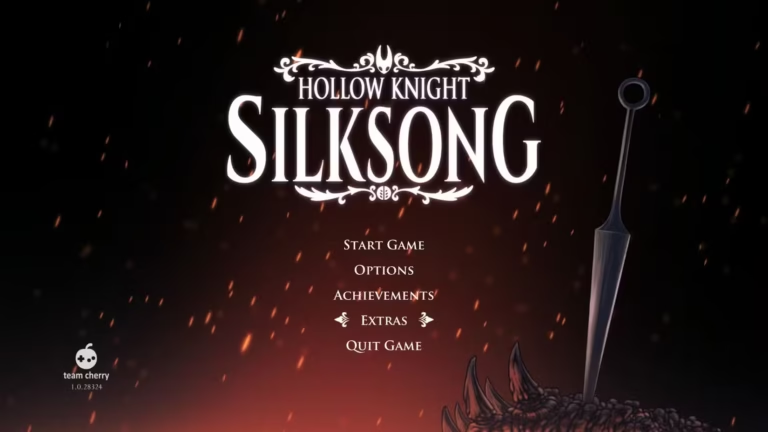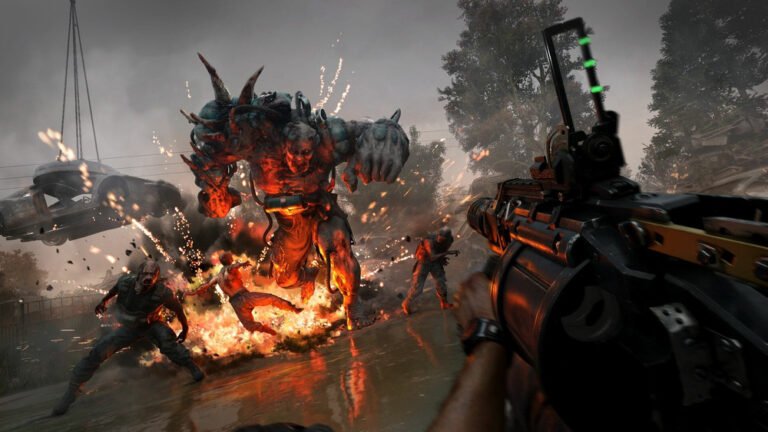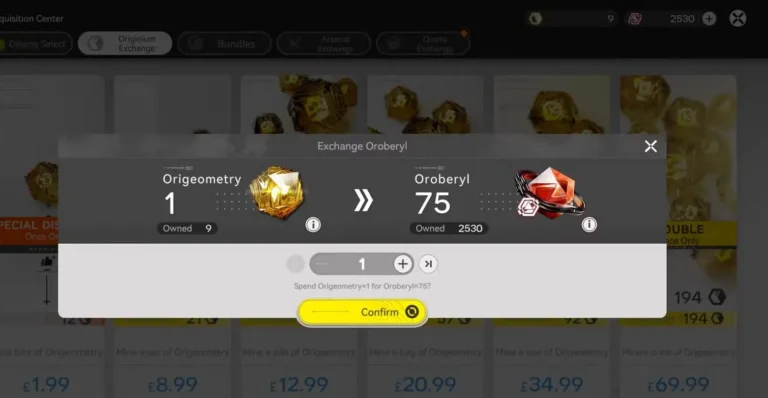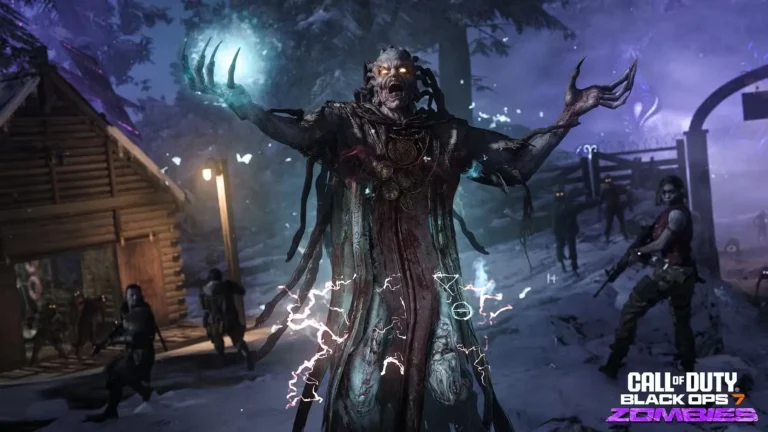Managing a team of reformed supervillains sounds cool until you’re staring at eight different stat sheets trying to figure out who to send to a burning building. Welcome to life as a dispatcher in Dispatch, where your hero selection can mean the difference between saving the day and creating an interdimensional incident.
Here’s the thing about Dispatch that makes it brilliant: every hero is uniquely broken in their own special way. They’re ex-villains, remember? They’ve got massive powers, glaring weaknesses, and dispatch conditions that can either make them unstoppable or completely useless depending on how you deploy them.
This guide breaks down all eight heroes in your roster, their skills, powers, and—most importantly—the weird conditional abilities that transform them from mediocre to godlike when used correctly.
Understanding Hero Skills in Dispatch – The Core Mechanics
Before diving into individual heroes, let’s talk about the five core stats that determine success or failure:
- Combat: Fighting, physical confrontation, direct action
- Intelligence: Problem-solving, technical challenges, investigation
- Charisma: Negotiation, de-escalation, public relations
- Mobility: Speed, agility, chase scenarios, evasion
- Vigor: Endurance, durability, sustained effort
Each emergency call requires specific stat combinations. A hostage situation might need high Charisma and Intelligence, while a supervillain rampage demands Combat and Vigor.
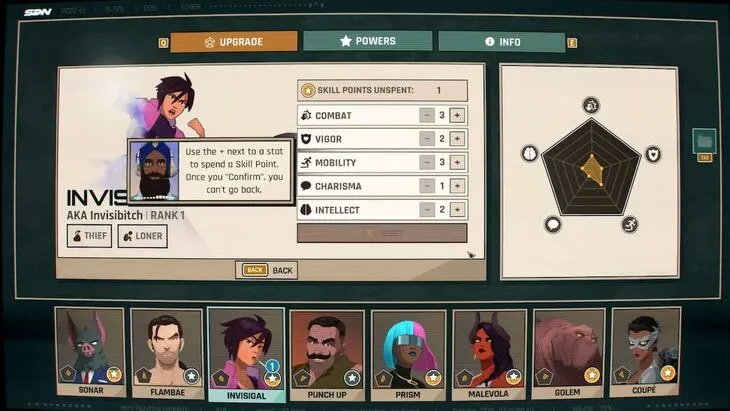
Leveling Up: Build Your Dream Team
When heroes successfully complete missions, they earn XP (with bonus XP for exceptional performance). Level-ups give you skill points to distribute however you want.
The eternal question: Do you shore up weaknesses or double down on strengths?
My take: It depends on the hero’s dispatch condition. Some heroes (like Flambae) get exponentially better when you max their already-strong stats. Others (like Golem) benefit from being well-rounded jacks-of-all-trades.
We’ll cover optimal builds for each hero below.
Complete Dispatch Hero Roster – Skills, Powers & Best Uses
Sonar – The Intellectual Shapeshifter
Main Strengths: Intellectual, Hybrid
Archetype: Versatile problem-solver with a transformative twist
Starting Skills:
- Combat: 2
- Intelligence: 4
- Charisma: 3
- Mobility: 2
- Vigor: 1
Powers:
- Bat Physiology: Transforms into a giant bat
- Flight: Aerial mobility advantage
Dispatch Condition (CRITICAL):
After every situation, Sonar transforms into bat form, swapping his stats:
- Intelligence → Combat
- Charisma → Vigor
What this means: Sonar is essentially two different heroes depending on when you deploy him. Send him first and he’s your smart negotiator. Send him second and he’s a combat bruiser.
Synergy Team-up: Malevola
Optimal Strategy:
- First call of the shift: Use Sonar for Intelligence/Charisma-heavy situations
- Second call onward: He becomes a Combat/Vigor specialist
- Leveling priority: Boost Intelligence AND Combat since you benefit from both forms
- Advanced tactic: If you need multiple Intelligence calls in one shift, save Sonar for last to keep his human form longer
Best uses: Complex investigations, tech challenges (human form) / Brawls, endurance scenarios (bat form)
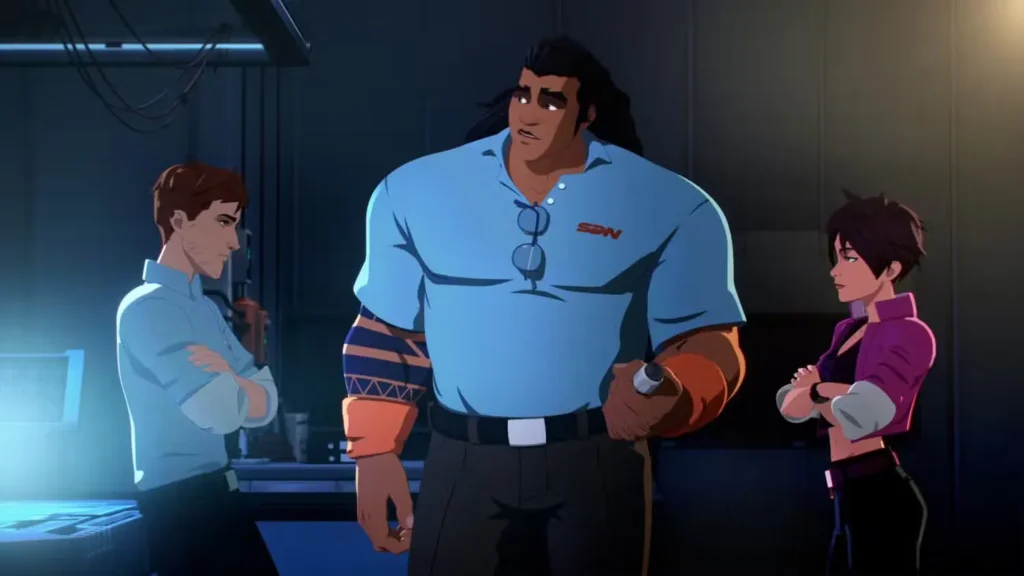
Flambae – The Escalating Pyromaniac
Main Strengths: Fire, Fighter
Archetype: High-risk snowball fighter
Starting Skills:
- Combat: 4
- Intelligence: 1
- Charisma: 2
- Mobility: 3
- Vigor: 2
Powers:
- Pyrokinesis: Fire manipulation and creation
- Flame Invulnerability: Can’t be hurt by fire
- Pyro-Propulsion: Jet-powered flight using flames
Dispatch Condition (GAME-CHANGER):
After each success, Flambae gains +1 Combat and +1 Mobility. Effects stack until he fails, then reset to base stats.
What this means: Flambae is a momentum hero. Send him on easy calls first to stack buffs, then deploy him to increasingly difficult situations as he powers up. One failure and he’s back to square one.
Synergy Team-up: Prism
Optimal Strategy:
- Early shift: Send to high-percentage Combat calls to build stacks
- Mid shift: Now boosted, tackle harder missions
- Never send to risky calls first: Protect that streak
- Leveling priority: Max Combat and Mobility to amplify the stacking effect
- Pair with Prism: Her duplication ability copies his stacked stats for insane value
Best uses: Action-heavy shifts where you can build momentum, fire-related emergencies (obvious synergy)
Watch out for: Intelligence-heavy calls (his 1 Intelligence is brutal), any high-risk situation that might break his streak
Invisigal – The Solo Operative
Main Strengths: Thief, Loner
Archetype: Stealth specialist who works better alone
Starting Skills:
- Combat: 3
- Intelligence: 2
- Charisma: 1
- Mobility: 3
- Vigor: 3
Powers:
- Invisibility: The classic
- Hand-to-Hand Combat: Close-quarters specialist
Dispatch Condition (EFFICIENCY BOOST):
- When sent solo, gains faster travel time
- Can reveal hidden call information (number of slots, crime type) before dispatch
What this means: Invisigal is your reconnaissance and speed-run hero. She’s not the strongest in any single category, but her information advantage and travel speed make her invaluable.
Synergy Team-up: None (she’s a loner, remember?)
Optimal Strategy:
- Send solo for maximum efficiency: Pairing her wastes her travel speed bonus
- Use as scout: Her reveal ability helps you plan subsequent dispatches
- Time-sensitive calls: Her speed advantage shines here
- Leveling priority: Boost Mobility and Combat for solo efficiency, or Intelligence for versatility
- Advanced tactic: Send her first to reveal upcoming call patterns, then optimize your team composition
Best uses: Stealth missions, solo infiltrations, time-critical scenarios, scouting unknown situations
Watch out for: Her 1 Charisma makes negotiation impossible—don’t send her to hostage situations
Coupe – The Positional Assassin
Main Strengths: Shadow, Assassin
Archetype: Shadow-manipulating striker with positioning requirements
Starting Skills:
- Combat: 4
- Intelligence: 3
- Charisma: 1
- Mobility: 3
- Vigor: 1
Powers:
- Umbrakinetic Weaponry: Creates weapons from shadows
- Umbrakinetic Flight: Shadow-powered flight
- Superhuman Accuracy: Never misses
Dispatch Condition (POSITIONING MATTERS):
In multi-slot calls (2+ heroes):
- First slot: +1 Combat
- Second slot: +1 Mobility
What this means: Coupe’s effectiveness depends entirely on where you place him in the team lineup. He’s a tactical puzzle piece.
Synergy Team-up: Punch Up
Optimal Strategy:
- Combat-heavy calls: Put Coupe in slot 1
- Chase/speed scenarios: Put Coupe in slot 2
- Pair with Punch Up: Their synergy amplifies both heroes
- Leveling priority: Max Combat first (his primary role), then Mobility
- Never send solo: You lose his conditional bonuses entirely
Best uses: Precision strikes, assassination contracts, multi-hero combat scenarios
Watch out for: His 1 Vigor and 1 Charisma make him a glass cannon who can’t negotiate
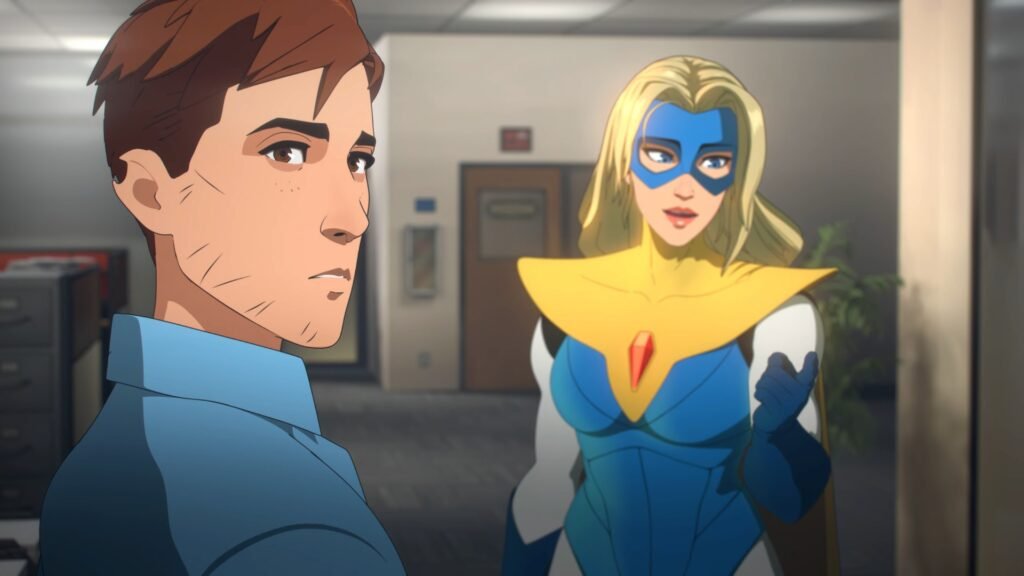
Punch Up – The Unkillable Brawler
Main Strengths: Flyweight, Brawler
Archetype: Tiny powerhouse with size-manipulation powers
Starting Skills:
- Combat: 3
- Intelligence: 1
- Charisma: 3
- Mobility: 1
- Vigor: 4
Powers:
- Picnokinesis: Size manipulation (shrinking/growing)
- Superhuman Strength & Durability: Hits like a truck, built like a tank
- Pain Immunity: Feels nothing
Dispatch Condition (IMMORTALITY):
- Doesn’t receive injury debuffs
- Cannot be downed
What this means: Punch Up is your insurance policy. Send her into the meatgrinder situations that would hospitalize other heroes. She’ll come back ready for more.
Synergy Team-up: Coupe
Optimal Strategy:
- High-risk situations: No penalty for getting hurt
- Back-to-back tough calls: While others need recovery, Punch Up keeps going
- Pair with healers: Actually, you don’t need to—she’s self-sustaining
- Leveling priority: Max Combat and Vigor to become an unstoppable tank
- Pair with Coupe: Their synergy creates a devastating combat duo
Best uses: Brutal combat scenarios, sustained operations, suicide missions (not literally, but you know)
Watch out for: Her 1 Intelligence and 1 Mobility make her useless for chases or puzzles. She’s a hammer, not a scalpel.
Malevola – The Support Specialist
Main Strengths: Duelist, Half-Demon
Archetype: Healing support with demonic powers
Starting Skills:
- Combat: 3
- Intelligence: 2
- Charisma: 3
- Mobility: 2
- Vigor: 2
Powers:
- Demon Physiology: Half-demon heritage grants supernatural abilities
- Portal Creation: Dimensional travel
- Wound Transferal: Can transfer injuries between people
Dispatch Condition (HEALER):
When paired with another hero, Malevola can heal them, gaining:
- +1 Charisma
- +1 Vigor
- Effects stack
What this means: Malevola gets stronger the more she heals. She’s your team medic who becomes increasingly powerful throughout a shift.
Synergy Team-up: Sonar
Optimal Strategy:
- Always pair her: Solo Malevola wastes her entire kit
- Pair with injured heroes: Maximize healing opportunities for stat stacks
- Long shifts: Her stacking makes her a late-game powerhouse
- Leveling priority: Balanced build—her stacking handles growth naturally
- Pair with Sonar: Their synergy creates versatile combinations for any situation
Best uses: Multi-hero operations, healing injured teammates, sustained campaigns where stacking matters
Achievement tie-in: Remember the Phoenixes Down trophy? Heal the same hero twice with Malevola to unlock it.
Golem – The Adaptive Tank
Main Strengths: Defender, Versatile
Archetype: Shape-shifting earth elemental
Starting Skills:
- Combat: 3
- Intelligence: 1
- Charisma: 3
- Mobility: 1
- Vigor: 4
Powers:
- Morphological Being: Can reshape his body
- Earth Mimicry: Transforms into stone/earth materials
- Regenerative Healing: Self-repairs over time
Dispatch Condition (SLOT-BASED BUFFS):
In multi-slot calls, specific slots grant:
- +2 to one stat
- -1 to other stats
- (Exact slots and stats vary by call)
What this means: Golem’s effectiveness is situational and dependent on call structure. He’s adaptable but requires attention to slot positioning.
Synergy Team-up: None listed
Optimal Strategy:
- Read the call carefully: Check which slot gives beneficial buffs
- Flexibility is key: Golem can fill multiple roles depending on positioning
- Leveling priority: Well-rounded build since his buffs compensate for weaknesses
- Pair strategically: Use his slot buffs to cover team deficiencies
Best uses: Defensive operations, tanking damage, situations requiring adaptability
Watch out for: His 1 Intelligence and 1 Mobility are serious weaknesses when not buffed
Prism – The Pop Star Duplicator
Main Strengths: Pop Star, Illusionist
Archetype: Light-manipulating celebrity with duplication powers
Starting Skills:
- Combat: 4
- Intelligence: 2
- Charisma: 4
- Mobility: 1
- Vigor: 1
Powers:
- Photokinesis: Light manipulation
- Photoionization: Convert light to solid constructs
- Holographic Manipulation: Creates convincing illusions
Dispatch Condition (DUPLICATION):
When dispatched in the second slot, Prism duplicates the hero to her left with half their stats.
What this means: Prism is a force multiplier. Pair her with your strongest hero and suddenly you have 1.5x that hero on the field.
Synergy Team-up: Flambae
Optimal Strategy:
- Always use slot 2: Deploying her elsewhere wastes her power
- Pair with stat-stacked heroes: Duplicate Flambae after he’s gained +4/+4 from successive wins
- Leveling priority: Max Combat and Charisma (her natural strengths)
- Advanced tactic: Duplicate heroes with beneficial dispatch conditions for double value
Best uses: High-profile events (she’s a celebrity), situations requiring Combat + Charisma, amplifying your best hero
Watch out for: Her 1 Mobility and 1 Vigor make her fragile and slow. The duplication better be worth it.
Best Team Composition Strategies for Dispatch Missions
Now that you know each hero individually, let’s talk about building effective teams for different scenarios.
The Combat Dream Team
Flambae (Slot 1) → Build stacks
Prism (Slot 2) → Duplicate stacked Flambae
Result: Devastating firepower with combined Combat of 8+ mid-shift
The Balanced Strike Team
Sonar (Human form) → Intelligence/Charisma
Malevola → Healing support + versatility
Result: Covers most situations, with Soupe as backup for sustained operations
The Tank Rush
Punch Up (Slot 1) → Unkillable frontline
Golem (Slot 2) → Adaptive defense with regeneration
Result: Unstoppable force for brutal combat scenarios
The Speed Ops
Invisigal (Solo) → Maximum travel speed + reconnaissance
Follow-up with targeted specialist based on her revealed info
Result: Efficient, informed dispatch decisions
The Synergy Pairs
- Coupe + Punch Up: Combat synergy maximizes damage output
- Sonar + Malevola: Versatile coverage with healing support
- Flambae + Prism: Stacking + duplication = exponential power growth
Leveling Guide – Specialists vs. Generalists in Dispatch
Specialists (max 1-2 stats):
- Flambae: Max Combat + Mobility for stack amplification
- Invisigal: Max Mobility + Combat for solo efficiency
- Punch Up: Max Combat + Vigor for unkillable bruiser
Generalists (balanced distribution):
- Sonar: Balance Intelligence and Combat to maximize both forms
- Malevola: Let stacking handle growth, shore up weaknesses
- Golem: Well-rounded to benefit from any slot buff
Hybrids (2-3 focused stats):
- Coupe: Combat primary, Mobility secondary, ignore Charisma/Vigor
- Prism: Combat + Charisma (her star power), ignore Mobility/Vigor
Advanced Tips & Pro Tactics for Dispatch Mastery
1. Track Conditional States
Always know:
- How many times has Flambae succeeded? (Stack count)
- Is Sonar in human or bat form?
- Which heroes are injured? (Malevola healing opportunities)
2. Plan the Entire Shift
Don’t dispatch call-by-call. Look at the full queue and:
- Stack Flambae early for hard fights later
- Use Invisigal’s reveal to optimize subsequent sends
- Position Coupe/Golem in beneficial slots
3. Protect Your Momentum Heroes
One failed call resets Flambae’s stacks completely. Send him to:
- High-percentage successes early
- Guaranteed wins to build stacks
- Risky situations only after he’s powered up
4. Abuse Prism’s Duplication
She’s the most OP hero if used correctly:
- Duplicate stacked Flambae (8+ Combat mid-shift)
- Duplicate Punch Up (two unkillable brawlers)
- Duplicate specialized heroes for double coverage
5. Use Punch Up as Your Safety Net
When a call looks dangerous and might injure your heroes:
- Send Punch Up—she’ll succeed or fail without penalty
- Save fragile heroes (Coupe, Prism) for safer situations
Common Mistakes in Dispatch and How to Avoid Them
❌ Sending Invisigal with partners: Wastes her speed bonus
❌ Using Flambae on risky calls first: One failure ruins his shift
❌ Ignoring slot positioning: Coupe, Golem, and Prism need specific slots
❌ Solo deploying Malevola: Her entire kit requires pairing
❌ Deploying Prism in slot 1: Her duplication only works in slot 2
Final Thoughts – Master Your Team for Mission Success
Dispatch isn’t about having the “best” heroes—it’s about understanding their conditions, synergies, and optimal deployment patterns. Every hero is broken in some way, and your job is to engineer situations where their specific brand of broken becomes unstoppable.
For more Dispatch guides:
Grab Dispatch on Steam and start building your dream team of reformed villains. Just remember: they’re unpredictable, powerful, and probably hate each other. Perfect coworkers, really.
Who’s your favorite hero to dispatch? Team Flambae stack-building or team Invisigal solo speed runs? Drop your strategies below—I’m always looking for new synergy combinations I haven’t tried yet.

